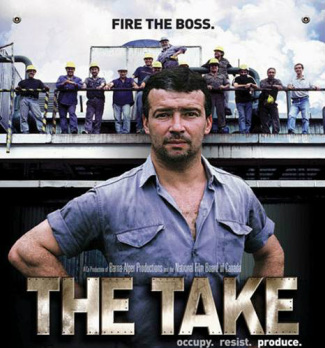 The Take documents factory takeovers in Argentina. The Take documents factory takeovers in Argentina. Tags: capitalism, class, economic sociology, globalization, marx/marxism, organizations/occupations/work, political economy, social movements/social change/resistance, theory, factory takeovers, labor, occupy, real utopias, worker cooperatives, subtitles/CC, 61+ mins Year: 2004 Length: 87:00 Access: YouTube Summary: This excellent documentary from Naomi Klein and Avi Lewis documents the extraordinary movement of factory takeovers in Argentina. As noted on the The Take's website, "In the wake of Argentina's dramatic economic collapse in 2001, Latin America's most prosperous middle class finds itself in a ghost town of abandoned factories and mass unemployment. The Forja auto plant lies dormant until its former employees take action. They're part of a daring new movement of workers who are occupying bankrupt businesses and creating jobs in the ruins of the failed system." By following the struggle of the Forja workers to regain control over its factory, it shows how workers formed networks and coalitions in their movement, the legal context of recuperated factories, the different organizational structures that workers develop to run their factories, the political reaction to neoliberalism, and the electoral race to shape Argentina's future. Accordingly, the movement serves as a unique bottom-up alternative to neoliberal capitalism. The film offers excellent illustrations of several sociological concepts, such as class consciousness and ideology. It also reflects Erik Olin Wright's concept of real utopias, which are "utopian ideals that are grounded in the real potentials of humanity ... [including] utopian designs of institution that can inform our practical tasks of navigating a world of imperfect conditions for social change" (2010: 6). As a "real utopia," the recuperated factories represent actually existing social projects that embody ideals of social justice, equality, and participatory democracy--they are not perfect (no social projects are), but they can serve as one model (of many) for what is possible. While the documentary was released in 2004, viewers may be interested to know that the movement of recovered factories continues in Argentina, including hundreds of workplaces and over 10,000 workers. For books on the movement of worker-run factories in Argentina, see Sin Patrón (2007) and The Silent Change (2009). There is also a recent (2013) example of one such factory in the US, Chicago's New Era Windows Cooperative. Submitted By: Paul Dean
2 Comments
Manuel Franco
7/29/2023 02:51:29 am
I just want to say Thank You to everyone who supported me through the years. My name is Manuel Franco, New Berlin, Wisconsin. My story of how I won the Powerball lottery of $768.4M is a bit of a tale. I have been playing Powerball tickets for 6 years now since I turned 18. I bought my first ticket on my 18 birthday. I was feeling very lucky that day because I had contacted Dr. Odunga Michael to help me with the winning Powerball numbers. I really had that great great feeling that I looked at the camera wanting to wink at it. I only did a tiny part of it and trusted him. He gave me the numbers after I played a couple other tickets along with it for $10. I checked my ticket after the winnings came online and saw the numbers were correct including the Power play. I screamed for about 10 minutes because it felt like a dream. I had won $768.4M. You can check my winning testimony with the lottery officials just with my name search. Thank you Dr Odunga. Well, his email is [email protected] and you can also call or Whats-app him at +2348167159012 so you guys can contact him
Reply
mark hold
7/8/2024 12:03:30 am
Herbal Penis Enlargement product is 100% guaranteed to Enlarge and get a better ERECTION, the reason why most people are finding it difficult to enlarge Penis is that they believe in medical reports, drugs and medical treatment which is not helpful for Penis Enlargement. Natural roots/herbs are the best remedies which can easily Enlarge your Penis permanently Contact Dr MOSES BUBA via Email: [email protected] or via WhatsApp: +2349060529305. for Natural root and herbal remedies put together to help Enlarge manhood and Erect healthily. I also learn that Dr MOSES BUBA also can cure other types of diseases, HEPATITIS B,DIABETICS,CANCER,HPV,LOW SPERM CAM, HIV/STDS, FIBROSIS LOST OF WEIGHT, BREAST ENLARGEMENT, HIPS and BUMS ENLARGEMENT etc .
Reply
Leave a Reply. |
Tags
All
.
Got any videos?
Are you finding useful videos for your classes? Do you have good videos you use in your own classes? Please consider submitting your videos here and helping us build our database!
|
 RSS Feed
RSS Feed
